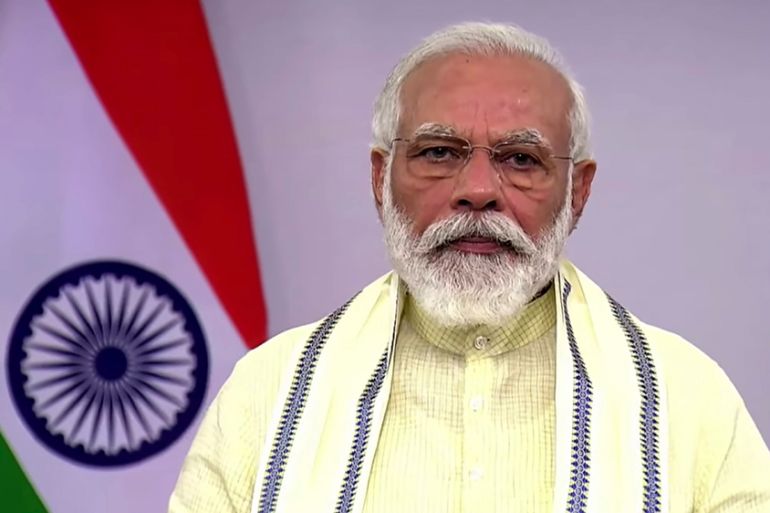COVID vaccination is the government’s ‘national commitment’: Modi
Addressing chief ministers of the worst-hit states, Indian prime minister promises the vaccine will reach everybody.

Indian Prime Minister Narendra Modi says providing the coronavirus vaccine is his government’s “national commitment”, and that the safety of all citizens will be assured.
“Each State and stakeholder has to work as a team to ensure that this mission is systematic, smooth and a sustained effort,” Modi said during a meeting with state chief ministers on the COVID-19 situation in which he told them national efforts would be in coordination with state governments.
Keep reading
list of 4 itemsMexico’s teachers seek relief from pandemic-era spike in school robberies
‘A bad chapter’: Tracing the origins of Ecuador’s rise in gang violence
Why is the US economy so resilient?
The meeting came as India’s COVID-19 cases surged in recent weeks, with the Supreme Court warning that the situation could worsen further if authorities did not effectively deal with the pandemic.
The court sought status reports from the states of Delhi, Gujarat, Maharashtra and Assam about the management of patients in the hard-hit states and steps taken to mitigate the situation. Delhi has been topping India in the number of infections and deaths in recent weeks.
India is currently the world’s second-worst-hit country by the pandemic after the US, with nearly 9.2 million infections, including more than 134,000 deaths.
K Srinath Reddy, president of the Public Health Foundation of India, told Al Jazeera that how achievable Prime Minister Modi’s targets are “will depend on how effective the governance is, how cooperative the people are”.

During the meeting with the chief ministers, Modi said the government was in touch with both Indian vaccine developers and manufacturers as well as international pharmaceutical companies and that states had to make the necessary preparations for storage and handling of vaccines.
Phase-three trials of India’s first vaccine, Covaxin, started last Monday. The vaccines has been developed by Hyderabad-based Bharat Biotech in collaboration with the Indian Council of Medical Research (ICMR) – India’s premier medical research body.
Tuesday’s meeting was attended by the chief ministers of eight states – Delhi, Maharashtra, Kerala, Bengal, Karnataka, Rajasthan, Chhattisgarh and Uttar Pradesh.
“In addition to taking appropriate measures, prime minister has repeatedly reminded citizens to take precautions to ensure that it doesn’t spread further. Today again he has spoken to CMs to not loose focus and infection rate should be maintained below 5 percent despite higher testing rates,” BJP spokesman Syed Zafar Islam told Al Jazeera.
“States have been advised to take necessary steps to curb the rate of positive cases. Government of India is providing all the support to every state as they desire.”
India first priority for vaccine delivery
Meanwhile, the Serum Institute of India, the world’s largest vaccine manufacturer by volume, said the country will be given first priority for the delivery of the AstraZeneca/Oxford vaccine after its British developers claimed success following mass testing.
Chief executive of the Serum Institute, Adar Poonawalla, said the manufacturer has already produced 40 million doses of the vaccine so far.
“By January, we should have, you know, 100 million doses is minimum because we’ve already made 40 million doses,” Poonawalla, whose father founded the vaccine manufacturer, told television broadcaster NDTV.
Poonawalla said he expected that some 90 percent of Serum Institute’s doses would be sold to the Indian government at approximately 250 rupees (US$3).

“Most of that 90 percent is what’s going to go to the government of India and maybe 10 percent in the private market at the higher price (of 1,000 rupees),” he said.
AstraZeneca and Oxford University said on Monday that their drug had proved on average 70 percent effective at stopping the virus after trying it on 23,000 people.
The Oxford drug can be transported easily at normal refrigerator temperatures – unlike some of the other candidates, which require extremely cold storage.
The US biotech firm Moderna Inc and drugmakers Pfizer and BioNTech said earlier this month that their experimental vaccines were 94.5-percent and 90-percent effective respectively.
India’s Health Minister Harsh Vardhan told India Today TV earlier on Monday that he expected between 250-300 million Indians would be immunised by September next year.
First in line would be health workers, other front-line workers including the police, paramilitary and those working in sanitisation, as well as people aged above 65, Vardhan added.
Additional reporting by Bilal Kuchay from New Delhi